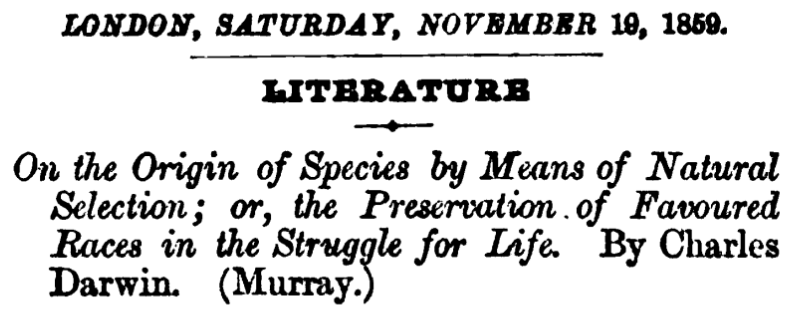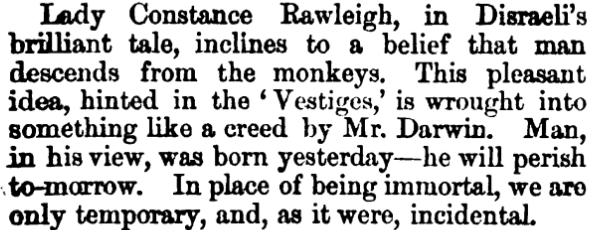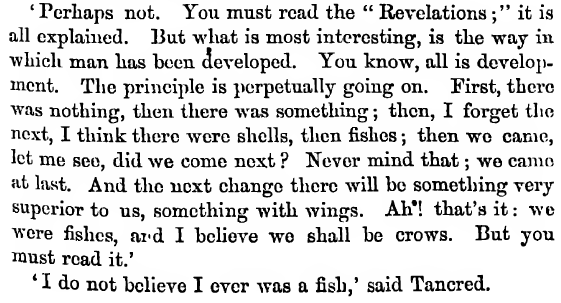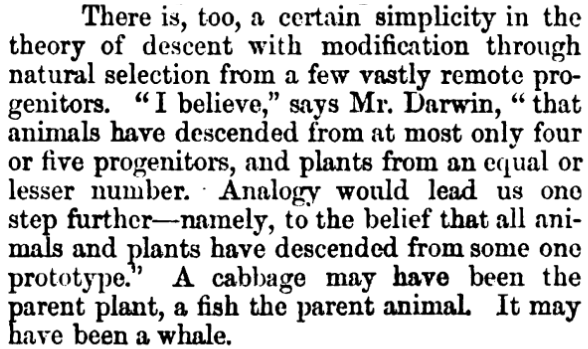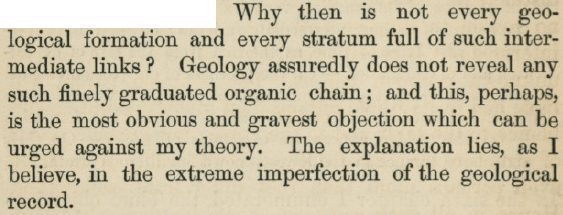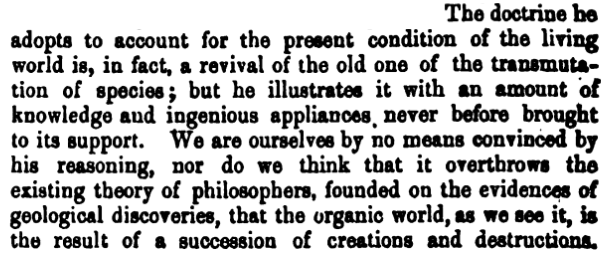In my last posts I have been highlighting the fact that Darwin’s theory of evolution ascribed the origin of the first one or few primordial organisms to the work of the Creator, and have looked at Richard Owen’s criticism (Edinburgh Review, April 1860) of his apparent inconsistency in balking at the miraculous nature of special creation on one page (Origin of Species, 1st edition, 1859, 483), and invoking it on the next (p. 484).
I was aware that the German paleontologist H. G. Bronn had criticised Origin of Species on similar grounds in a review published January 1860, and being interested to find out whether he was the first to do so, began to read reviews (gleaned mainly from here (p. 599), here (p. 25-27), and here) published prior to his. They are of sufficient interest in their own right, in my opinion, to merit a few observations.
My account of Huxley’s review of Origin in The Times is preceded by an introduction, which will extend into my next posts, of his change of view about evolution just prior to the book’s publication.
John R. Leifchild in The Athenæum, 19 november 1859
The first appeared in ‘the chief literary weekly of the time’, the Athenæum, 1 on 19 November 1859, five days before the publication of Origin:
Leifchild (1815-1889) was a Government Commissioner of Mines and author of works on mining and coal, who contributed many reviews to the Athenæum on geological matters, among others. He introduced (pp. 659-60) Origin of Species as an heir to The Vestiges of Natural Creation (1844), which had created a sensation at the time of its publication and for years after. 2 The anonymous author, revealed forty years later to have been Robert Chambers a Scottish publisher, had put forward a theory of evolution (then called ‘development’) from nebulae to man. One species had given birth to another, he claimed, until
the second highest gave birth to man,
who was at the pinnacle: 3
As Leifchild said (659, col. 1), the author of Vestiges had ‘hinted’ that man was descended from monkeys:
The reference is to Disraeli’s novel Tancred published three years after Vestiges, in which Lady Rawleigh offers the hero a copy of ‘Revelations of Chaos‘, immediately recognisable as Vestiges. Our forebears were fish rather than monkeys according to Disraeli’s character, but the allusion stands well enough, and illustrates the impact that Vestiges had had, twenty five years before: 4
(About the crows, Lady Rawleigh’s memory was at fault. Chambers had in fact drawn an analogy between crows, which he considered the highest ‘type of types’ (p. 269) of birds, and man, the ‘type of types’ (p. 272) of the animal kingdom.)
Leifchild sees a ‘certain simplicity’ in Darwin’s theory of common descent from one or a few progenitors, but seems to take it less than fully seriously, suggesting the whale, the cabbage and the fish, as possible contenders for the role:
Did palaeontology support the theory? Darwin had admitted that it did not, pleading its imperfections to explain the lack of transitional forms: 5
Leifchild found this (660, col. 1) an allowable defence of the theory, even if it left it without positive confirmation from the fossil record:
An allied and even ‘much graver’ difficulty, as Darwin himself had put it, was the sudden appearance of groups of species in the lowest known fossil-bearing strata (p. 306):
The difficulty was that a group of allied species must, according to his theory, have been descended from a single progenitor, but this was not so far to be found:
He had felt forced to propose a vast period of time prior to the Silurian, when the world had
‘swarmed with living creatures’
which had not, however, left a record (p. 307):
‘Extend and multiply such assumptions’, Leifchild protested (660, col. 1),
and the theories may take any form you please.
Leifchild expected that the book would attract attention, and concluded by leaving it and its author to the mercies of the protagonists:
John Crawfurd in the Examiner, 3 December 1859
Another weekly periodical, The Examiner, which ‘espoused radical liberal views’ 6 reviewed (p. 772-3) Origin on 3 December 1859:
The reviewer, John Crawfurd FRS (1783-1868), was a past member of the Council of the Geological Society, 7 and had become ‘the foremost expert on South-East Asia in Britain’. 8 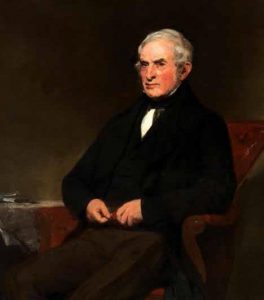 His geological observations in Malaysia were praised in 1996 by a Malaysian geologist for their accuracy and the ‘surprising modernity of the interpretations’. 9 Thomas Carlyle told his brother John in 1853 that he bought The Examiner only because ‘one finds old Crawfurd &c in it’. 10
His geological observations in Malaysia were praised in 1996 by a Malaysian geologist for their accuracy and the ‘surprising modernity of the interpretations’. 9 Thomas Carlyle told his brother John in 1853 that he bought The Examiner only because ‘one finds old Crawfurd &c in it’. 10
He described Darwin’s theory as a
revival of the old one of transmutation
and was not convinced by it, preferring what he called the existing theory that the organic world was the product of
a succession of creations and destructions.
Of the
most obvious objections to Mr Darwin’s theory,
Crawfurd pointed out first of all (772, col. 3) that
variation in plants and animals in the wild state is very rare,
and when it does occur it is, most commonly,
a defect and not improvement in the race.
With regard to the origin of life, Crawfurd took the view (773, col. 1) that Darwin had given no explanation of how his primordial form or forms had come into being:
He had certainly seen, since he quoted it, the final sentence of Origin, in which Darwin does in fact give an explanation, in terms of an implicitly divine impartation of life:
Crawfurd was himself a creationist, but did not apparently hold to a very literal understanding of the biblical account, since he believed in the separate creation of the ‘fair races’ and the ‘black’ races (and also in racial equality, for the record). 11 So there seems no obvious reason why he would find the special creation of a few primordial forms inadmissible as a scientific explanation. Perhaps what he meant was that Darwin had not accounted for the genesis of the primordial forms in the mainly naturalistic way he had accounted for the others.
Thomas Huxley in the Times
Of crucial importance to the reception of Origin of Species was the favourable review in The Times on 26 December 1859. It was ‘at that time
by far the most important English newspaper’
and had the ‘largest circulation of all’, 12 far larger than any monthly review. 13 It was written anonymously by Thomas Huxley (1825-95), who gained a reputation as Darwin’s ‘bulldog’, 14 and was indeed describing himself as such in the 1870s. 15
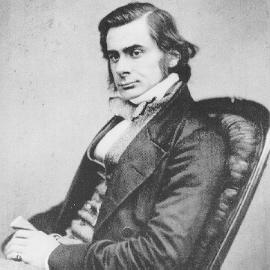 Huxley appears to have moved from outright opposition to an all-encompassing theory of organic evolution, to strong support for it, over the period 1854-59. In April 1854 in the British and Foreign Medico-Chirurgical review, in a savage attack on the tenth edition of Vestiges, Huxley admitted (p. 335) that the idea that the lowest species had progressively transmutated into the highest ones was a legitimate one, but would have to be weighed according to the evidence for and against it:
Huxley appears to have moved from outright opposition to an all-encompassing theory of organic evolution, to strong support for it, over the period 1854-59. In April 1854 in the British and Foreign Medico-Chirurgical review, in a savage attack on the tenth edition of Vestiges, Huxley admitted (p. 335) that the idea that the lowest species had progressively transmutated into the highest ones was a legitimate one, but would have to be weighed according to the evidence for and against it:
 But of such evidence, from the fossil record, there was none whatever (p. 336):
But of such evidence, from the fossil record, there was none whatever (p. 336):
For one thing, there appeared to be no correspondence between depth of rock strata and level of complexity of the organisms found there. The Lingulae, for example, which were found at the lowest level of the Silurian system, had:
a well-developed intestine and well-developed hearts, a nervous system, and long peculiarly developed arms
After presenting arguments of this sort for other classes, Huxley concluded (p. 337) that the fauna of the deep Silurian strata were far from the lowest in level of complexity, while the simpler forms of organism were noticeable by their absence:
These facts were well known, Huxley said, advance by the leading geologists, and ‘denied by no one’:
Three month later (July 1854) in his regular ‘Science’ column (p. 247) in the Westminster Review, in reviewing a new book by Karl Gustav Carus, Huxley made a claim that might at first sight be taken to imply a belief in evolution. He said that man is an
‘aberrant modification’
of a form which is common to many other animals, and ‘far more regularly and normally developed’ in some of these than in man:
Shocking though this may yet have been, and the Oxford Dictionary of National Biography gives it as an example of Huxley’s predilection for ‘outright provocation’, ‘modification’ here is not – as I understand it – to be equated with modification in history by descent, but with formal divergence from an archetype. Huxley sometimes discussed morphology in terms of modifications from an ‘imaginary’ but yet ‘true’ archetypal form, which he sought to distinguish from the Platonic ἰδέα, as in this 1853 presentation about the cephalous mollusk: 16
Huxley concluded that there was no ‘anamorphism’, by which he meant progression from lower to higher type, 17 within this group of cephalous mollusks, but only evolution within one type:
More generally, the doctrine of archetypes, which he considered fundamental to zoology, precluded such an ascent from lower to higher type anywhere in the animal kingdom, and he doubted that it had ever happened:
According to Joel Schwartz, writing (p. 147) in the Journal of the History of Biology (p. 147), Huxley had in 1854 a belief in limited evolution within large groups. Unless there was a change in his view between 1853 and 1854, which I have so far not found evidence for, even this may be overstated, since Huxley seemed to speak only of an evolution of a type within a group. But Schwartz’s characterisation of Huxley’s position as being a belief in
microevolution
only, captures the most essential point well:
The stark difference between Huxley’s view and his own was very clear to Darwin, to whom Huxley sent a copy of this paper on mollusks. In a letter to Huxley on 23 April 1853, Darwin expressed surprise at his opposition to ‘anamorphism’, that is, to an upward evolutionary ascent beyond the limits of a fixed archetype. He seemed to accept the value of the concept of the archetype but then gave the term a rather different meaning by proposing that it was manifested at an embryonic stage and was capable of further development, or ‘evolution’ in modern parlance:
We may leave Huxley here, for now, definitely opposed to transmutation theories. In my next post I begin to describe the partial shift in his views which allowed him to lend positive support to Darwin at the time of the publication of Origin of Species, through sympathetic reviews in The Times and elsewhere.
Andrew Chapman
Notes:
- Ellegård, A. (1990). Darwin and the general reader : The reception of Darwin’s theory of evolution in the British periodical press, 1859-1872. Chicago ; London: University of Chicago Press. p. 29 ↩
- Secord, J. (2000). Victorian sensation : The extraordinary publication, reception, and secret authorship of Vestiges of the Natural History of Creation. Chicago, Ill. ; London: University of Chicago Press. p.1. For the attribution of the anonymous Athenæum review to Leifchild, see Darwin Correspondence Project, “Letter no. 2537,” accessed on 17 November 2017, http://www.darwinproject.ac.uk/DCP-LETT-2537 and footnote 2. ↩
- Vestiges of the Natural History of Creation (London: Churchill, 1844) p. 234. Link. ↩
- Disraeli, B. (1847). Tancred : Or, The new crusade. London :: Henry Colburn, Publisher, Great Marlborough Street. p. 109. Link. ↩
- Charles Darwin, ‘The Origin of Species’ (London: Murray, 1859) p. 280. Link. ↩
- Knapman, G. (2016). Race and British colonialism in Southeast Asia, 1770-1870 : John Crawfurd and the politics of equality (Empires in perspective). London. p. 241. Link. ↩
- The Zoological Journal, Vol. III (London: Phillips, 1828) p. 610. Link. ↩
- Knapman, G. (2016). Race, polygenesis and equality: John Crawfurd and nineteenth-century resistance to evolution. History of European Ideas, 1-15. p. 1. Link. ↩
- T. T. Khoo, ‘Comments on John Crawfurd’s Observations on some Geological Aspects of the Malaysian Region’, Journal of the Malaysian Branch of the Royal Asiatic Society, Vol. 69, No. 2 (271) (1996), pp. 61-70. p. 61. ↩
- Knapman, G. (2016). Race and British colonialism in Southeast Asia, 1770-1870 : John Crawfurd and the politics of equality (Empires in perspective). London. p. 242. Link. ↩
- Livingstone, D. (2008). Adam’s ancestors : Race, religion, and the politics of human origins. Baltimore, Md. ; London: Johns Hopkins University Press. p. 113. Link. ↩
- Ellegård, p. 29 ↩
- Conlin, J. (2014). Evolution and the Victorians : Science, culture and politics in Darwin’s Britain. London. p. 94. Link. ↩
- ‘Huxley, Thomas Henry’ by Adrian Desmond (Oxford Dictionary of National Biography) Link. ↩
- Browne, E. (2002). Charles Darwin. Vol. 2. London: Jonathan Cape. p. 105. ↩
- T. H. Huxley, ‘On the Morphology of the Cephalous Mollusca’, (originally published in the Philosophical Transactions the Royal Society, vol. cxliii, 1853, pt. 1, pp. 29-66), in ‘Scientific Memoirs’, Vol. I (London: Macmillan, 1898) 152-193, p. 176-7. By 1858, he was preferring to avoid the term ‘Archetype’, because of its connotations, but he still conceived of ‘various actual forms’ as modifications of an abstract or ‘typical’ form, which I think comes to much the same thing. See ‘On the Theory of the Vertebrate Skull’, Scientific Memoirs I, pp 571, 538. ↩
- Footnote 6, Darwin Correspondence Project, “Letter no. 1480,” accessed on 16 November 2017, http://www.darwinproject.ac.uk/DCP-LETT-1480 Also published in The Correspondence of Charles Darwin, vol. 5. ↩
